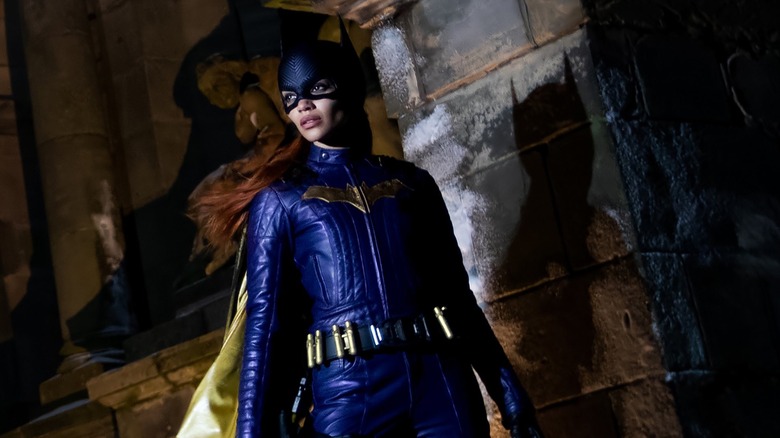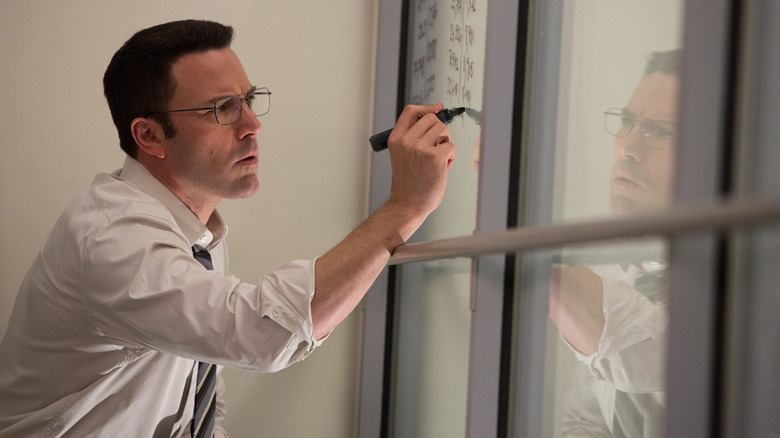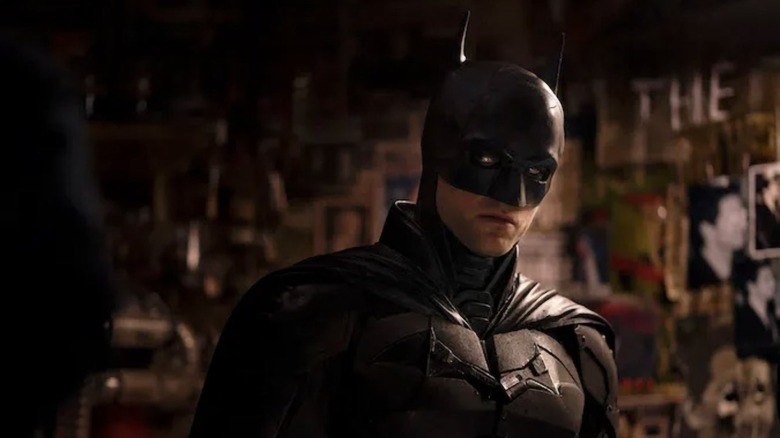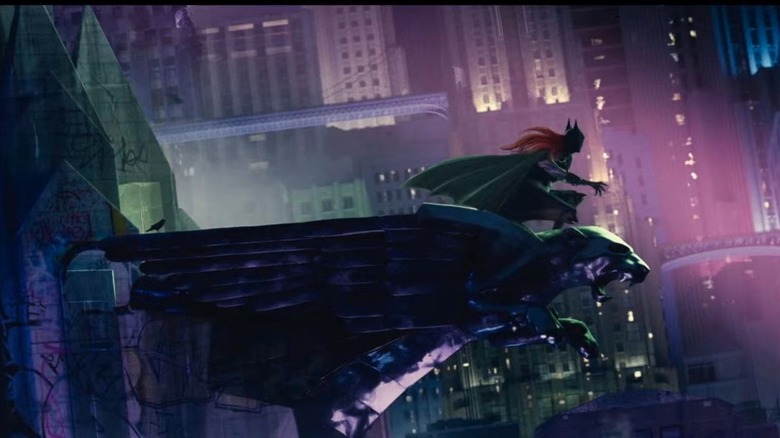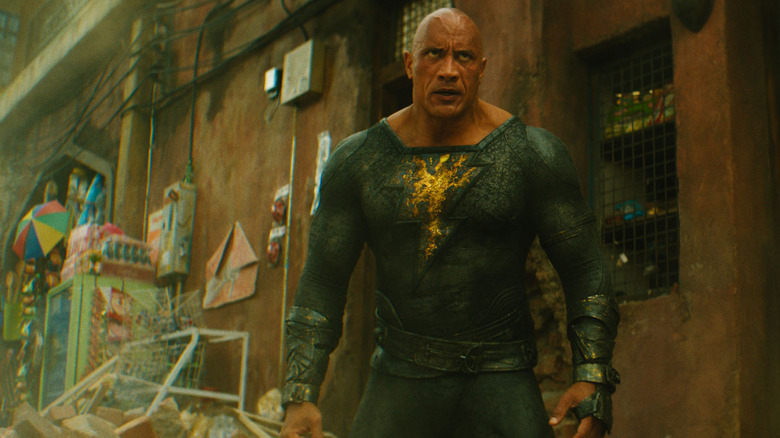Why Was The Batgirl Movie Canceled? Here's What We Know So Far
The entertainment world was rocked yesterday when it was revealed that the upcoming "Batgirl" movie, which was nearly complete and had already been going through test screenings, was being shelved by Warner Bros. Discovery. Not dumped to HBO Max, not being sold to another company. Scrapped entirely, and left to languish in the vaults of the studio, presumably forever. The studio is also not releasing a sequel to "Scoob," despite it also being nearly finished. And these are not small movies — they came with $90 million and $40 million budgets, respectively. A studio straight-up not releasing movies that expensive is flat-out unprecedented in Hollywood history and, as a result, has sent shockwaves through the industry.
So the big yet simple question lingers: why? Warner Bros. Discovery did release a statement on the matter, but one that only provides some hints as to the answer of that question.
"The decision to not release Batgirl reflects our leadership's strategic shift as it relates to the DC universe and HBO Max. Leslie Grace is an incredibly talented actor and this decision is not a reflection of her performance. We are incredibly grateful to the filmmakers of Batgirl and Scoob! Holiday Haunt and their respective casts and we hope to collaborate with everyone again in the near future."
Warner Bros. Discovery and its CEO David Zaslav are sure to continue to skirt around this in the media, but the puzzle can be put together with the information we have available — and the picture is a grim one. It ultimately boils down to Zaslav and his desire to reshape the company following the merger between WarnerMedia and Discovery earlier this year.
I will be looking at this all from a dispassionate, business-minded perspective, so take that into account. This article does not represent my personal feelings on the matter, nor is it my signing off on or condemning the company's strategy. It is a means of seeking an answer to that simple question posed by the headline.
The very bad optics of it all
Before diving into the business of it all in a dollars and cents sort of way, the big thing here is how bad this all looks for Warner Bros. Leslie Grace, of "In the Heights" fame, plays the lead in "Batgirl," a film directed by Adil El Arbi and Bilall Fallah, who helmed "Bad Boys for Life." So, the studio just effectively scrapped a finished superhero movie with a Dominican-American lead actress directed by a Muslim filmmaking duo. Not a great look when the same studio gave Zack Snyder $100 million to finish his version of "Justice League," which was released directly to HBO Max.
The difference there is the change in regimes. That was the old guard's decision and it is extremely hard to imagine a guy like Zaslav letting that fly. Be that as it may, the look is still a bad one, and beyond that, every single person who worked on that film has been burned. All of that work will never be seen. El Arbi and Fallah surely had other offers and chose "Batgirl," a movie that will never be released now. Grace, an up-and-coming actress, had the chance to lead a big superhero film franchise. That chance is gone now. The relationships with these people are surely damaged in a major, major way.
Let us not forget that Brendan Fraser, who is having a nice little comeback, was playing the villain in the movie, and Michael Keaton was returning as Batman, which is a huge deal. All left to languish in a vault now. It's a bad look. Various reports have indicated that Warner Bros. Discovery hopes to work with Grace, as well as El Arbi and Fallah again and soon, but would they really want to after this?
Why throw $90 million down the toilet? An accounting loophole
The merger between WarnerMedia and Discovery was a costly one, with the new media conglomerate taking on heavy debt to make the deal happen. As a result, Zaslav has been committed to finding cost-saving measures wherever he can to trim billions from the budget. That's what all of this seems to hinge on. More specifically, Zaslav and co. may have a limited and unique business opportunity to cut their losses using a tax loophole.
Per a report from Deadline after the news broke, the decision to scrap "Batgirl" and "Scoob" came down to what was described as a "purchase accounting" maneuver. The company changed hands recently, and dramatically shifted strategy. As such, they are apparently able to scrap these films without having to carry the losses on its books. I'm no corporate accountant so I don't know the ins and outs, but, in essence, it works out for them on paper. It is also noted that this option expires in mid-August, which is why they are exercising the option now.
Is creative accounting that could save the company millions on a balance sheet worth the damage this does in terms of optics? It is extremely difficult to say, and I'm not here to say whether it is or isn't. But this came down to a ruthless business decision that resulted in the death of two pieces of art made by thousands of people.
Streaming vs theatrical and a changing corporate strategy
Much of this boils down to an industry-wide debate that Warner Bros. Discovery and, as a result, HBO Max, are taking a hardline stance on. In the era of streaming dominance, the question of theatrical versus streaming has been prevalent, particularly in a year in which the global box office is rebounding very well with hits like "Top Gun: Maverick," "Jurassic World Dominion," "Doctor Strange in the Multiverse of Madness," "Everything Everywhere All At Once," and many others.
In the case of Zaslav, he flat-out rejects what the previous regime did with "Project Popcorn," where all of Warner Bros.' 2021 movies were released on HBO Max the same day they hit theaters in an attempt to boost subscribers. The new regime feels that streaming exclusive movies don't often result in enough return on investment to justify the cost. Meanwhile, movies like "The Batman" can have a huge run at the box office, do well on VOD, then perform extremely well on HBO Max after the fact because the movie has become very much in-demand.
"Batgirl" was greenlit at $70 million and its budget ballooned to $90 million because of the pandemic. It wasn't made with theatrical in mind and, undoubtedly, a lot of that money went to pay actors' big salaries up front. So what we were likely left with was a smaller-scale superhero movie. Trying to increase the visual effects and shift it to a theatrical release would be extremely costly (and risky if the studio doesn't fully believe in the movie itself). And, with the regime feeling a streaming release doesn't get enough juice out of the squeeze, this is where we are. It comes down to the fact that Warner Bros. Discovery is going to be a theatrical-first company from here on out.
Brand protection
Another thing to consider is the broader strategies at play here with the biggest brands under the company umbrella. DC is right at the top of that list and it has been reported many, many times that Zaslav sees DC as a top priority. The executive seems to believe that the brand has not been maximized and is looking for someone to head up the company, much like what Marvel has in Kevin Feige. Changes are coming in that department and if "Batgirl" didn't fit in with the broader strategy, the new regime may have felt it was worth protecting the future of the brand as they see it.
The company's statement even flat-out says this is a "strategic shift as it relates to the DC universe and HBO Max." Is a $90 million loss an extreme example of implementing this sort of strategy? Absolutely. At the same time, it's not without precedent in the blockbuster space. Take, for example, the scrapped "Game of Thrones" prequel pilot that starred Naomi Watts. HBO is said to have spent $30 million on that single episode of TV, only to scrap it and move onto "House of the Dragon." It's not in the same ballpark financially, but the broader point of HBO feeling it was better for the franchise to do something different remains. There is value in not hurting the brand.
To that end, the original report from the New York Post regarding the cancelation of "Batgirl" linked it to poor test screenings. Other reports from journalists such as Collider's Steven Weintraub have said similar things about the film. Though other reports have suggested some test screenings went quite well. So, maybe it was mixed? Either way, if the studio felt confident that they had an absolute winner on their hands, it seems far less likely they would shelve it, regardless of a tax opportunity.
The DC universe is headed for a reset
What we're left with is this: Warner Bros. Discovery is shifting strategies dramatically and they are prepared to make some big waves in order to accelerate that shift. DC is a cornerstone of all this and "Batgirl" didn't fit the mold. The only reason Zaslav would do something this massive is if he has something dramatic in mind for the future. The only logical conclusion as it specifically relates to the DC universe is that a reset is coming. "The Flash" is navigating gigantic problems with Ezra Miller, the Snyderverse is dead despite the ugliness that continues to surround it, and the brand is currently splintered between several different universes. This is not going to continue.
What will that future look like? I do not know, but I can confidently read the tea leaves and say much of this has to do with a big, theatrically-focused future for DC Films. "Batgirl," at least in this incarnation, isn't part of that future.
